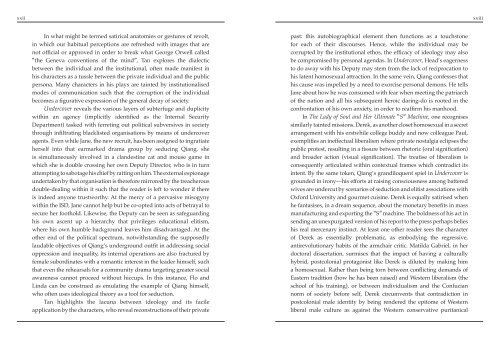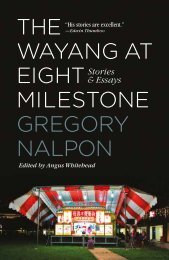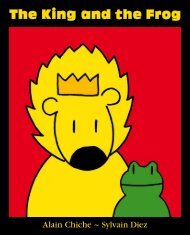View Sample - Epigram Books
View Sample - Epigram Books
View Sample - Epigram Books
You also want an ePaper? Increase the reach of your titles
YUMPU automatically turns print PDFs into web optimized ePapers that Google loves.
xxiixxiiiIn what might be termed satirical anatomies or gestures of revolt,in which our habitual perceptions are refreshed with images that arenot official or approved in order to break what George Orwell called“the Geneva conventions of the mind”, Tan explores the dialecticbetween the individual and the institutional, often made manifest inhis characters as a tussle between the private individual and the publicpersona. Many characters in his plays are tainted by institutionalisedmodes of communication such that the corruption of the individualbecomes a figurative expression of the general decay of society.Undercover reveals the various layers of subterfuge and duplicitywithin an agency (implicitly identified as the Internal SecurityDepartment) tasked with ferreting out political subversives in societythrough infiltrating blacklisted organisations by means of undercoveragents. Even while Jane, the new recruit, has been assigned to ingratiateherself into that earmarked drama group by seducing Qiang, sheis simultaneously involved in a clandestine cat and mouse game inwhich she is double crossing her own Deputy Director, who is in turnattempting to sabotage his chief by ratting on him. The external espionageundertaken by that organisation is therefore mirrored by the treacherousdouble-dealing within it such that the reader is left to wonder if thereis indeed anyone trustworthy. At the mercy of a pervasive misogynywithin the ISD, Jane cannot help but be co-opted into acts of betrayal tosecure her foothold. Likewise, the Deputy can be seen as safeguardinghis own ascent up a hierarchy that privileges educational elitism,where his own humble background leaves him disadvantaged. At theother end of the political spectrum, notwithstanding the supposedlylaudable objectives of Qiang’s underground outfit in addressing socialoppression and inequality, its internal operations are also fractured byfemale subordinates with a romantic interest in the leader himself, suchthat even the rehearsals for a community drama targeting greater socialawareness cannot proceed without hiccups. In this instance, Flo andLinda can be construed as emulating the example of Qiang himself,who often uses ideological theory as a tool for seduction.Tan highlights the lacuna between ideology and its facileapplication by the characters, who reveal reconstructions of their privatepast: this autobiographical element then functions as a touchstonefor each of their discourses. Hence, while the individual may becorrupted by the institutional ethos, the efficacy of ideology may alsobe compromised by personal agendas. In Undercover, Head’s eagernessto do away with his Deputy may stem from the lack of reciprocation tohis latent homosexual attraction. In the same vein, Qiang confesses thathis cause was impelled by a need to exorcise personal demons. He tellsJane about how he was consumed with fear when meeting the patriarchof the nation and all his subsequent heroic daring-do is rooted in theconfrontation of his own anxiety, in order to reaffirm his manhood.In The Lady of Soul and Her Ultimate “S” Machine, one recognisessimilarly tainted missions. Derek, as another closet homosexual in a secretarrangement with his erstwhile college buddy and now colleague Paul,exemplifies an ineffectual liberalism where private nostalgia eclipses thepublic protest, resulting in a fissure between rhetoric (oral signification)and broader action (visual signification). The treatise of liberalism isconsequently articulated within contextual frames which contradict itsintent. By the same token, Qiang’s grandiloquent spiel in Undercover isgrounded in irony—his efforts at raising consciousness among batteredwives are undercut by scenarios of seduction and elitist associations withOxford University and gourmet cuisine. Derek is equally satirised whenhe fantasises, in a dream sequence, about the monetary benefits in massmanufacturing and exporting the “S” machine. The boldness of his act insending an unexpurgated version of his report to the press perhaps belieshis real mercenary instinct. At least one other reader sees the characterof Derek as essentially problematic, as embodying the regressive,antirevolutionary habits of the armchair critic. Matilda Gabriel, in herdoctoral dissertation, surmises that the impact of having a culturallyhybrid, postcolonial protagonist like Derek is diluted by making hima homosexual. Rather than being torn between conflicting demands ofEastern tradition (how he has been raised) and Western liberalism (theschool of his training), or between individualism and the Confuciannorm of society before self, Derek circumvents that contradiction inpostcolonial male identity by being rendered the epitome of Westernliberal male culture as against the Western conservative puritanical
















